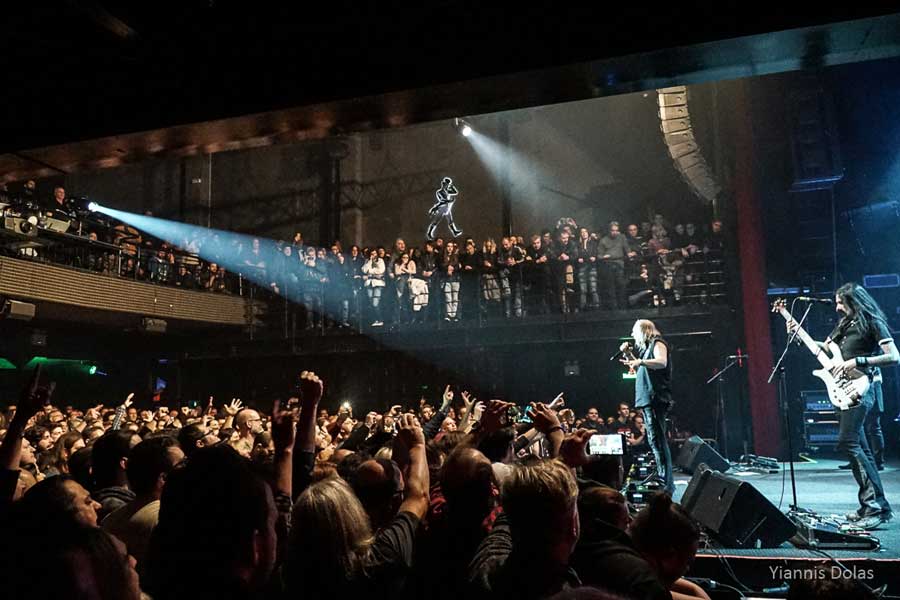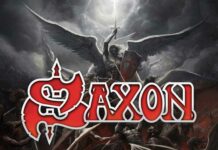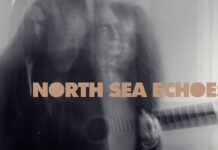
Once more, our beloved Uriah Heep will be in Greece to play two special shows in Athens and Thessaloniki, which mark the end of their 50th anniversary tour. Mick Box is happy as always to talk about what we’re going to witness on stage, Heep’s future plans, as well as the secret behind the band’s career, which lasts longer than half of century. He also talks about new guitarists, his approach in playing, John Wetton’s contribution, his relationship with the late Ken Hensley, the Press bad criticism, as well as the exposure of his generation to sex, drugs & rock’n’roll. Interview: Yiannis Dolas

Rockpages.gr: What’s should we expect on the two anniversary shows in Greece?
Mick Box: Well, it’s a special set for our 50th anniversary that we play in this tour. We play all that people expect to hear when they come to a Uriah Heep show. So, we’ll always do a “July Morning” and “Easy Living” and “Lady In Black” and “Gypsy” and songs like that. And then we’ll look at putting on some old songs that we haven’t ever done for a while, and also we split the show into two parts: we do an acoustic show, an electric show. So the acoustic show has got a real vibe to it. A campsite, fire, just sort of vibe to it. And then we come out all, you know, all guns blazing for the electric, too. So it’s good show if you like from the albums of the 1970s to “Living The Dream” it’s a good journey through our career.
We have a lot of film footage that includes every person that’s ever been in the band or even around the band, to be honest. It’s very respectful to everyone that’s been there. And it’s a really, really cool show. If you’re a Heep fan, it’s one worth shame because it does encompass everyone from the can. David, John, you know, everyone… even to… there’s one shot of the keyboard player that plays some keyboards on our first album. It was a school teacher of Jerry Bron, our manager. Even he is up there, so it’s literally everyone.
Rockpages.gr: Are you going to play any new songs?
Mick Box: No, no. We celebrate the 50th anniversary, so we’ll only shake up to where the 50th anniversary stopped. All the new stuff will come next year with the new album, that gets released on the 27th of January and it’s called “Chaos in Color”.
Rockpages.gr: When you ask a band that had already celebrated its 50th anniversary about its future plans, what’s the answer?
Mick Box: To continue doing what we love doing; making new music, because you should do new music and touring and communicating with our audience. I think as long as you’ve got your health and the passion to do so, you overcome all the hurdles in front of you. So we just keep doing what we’ve always done.
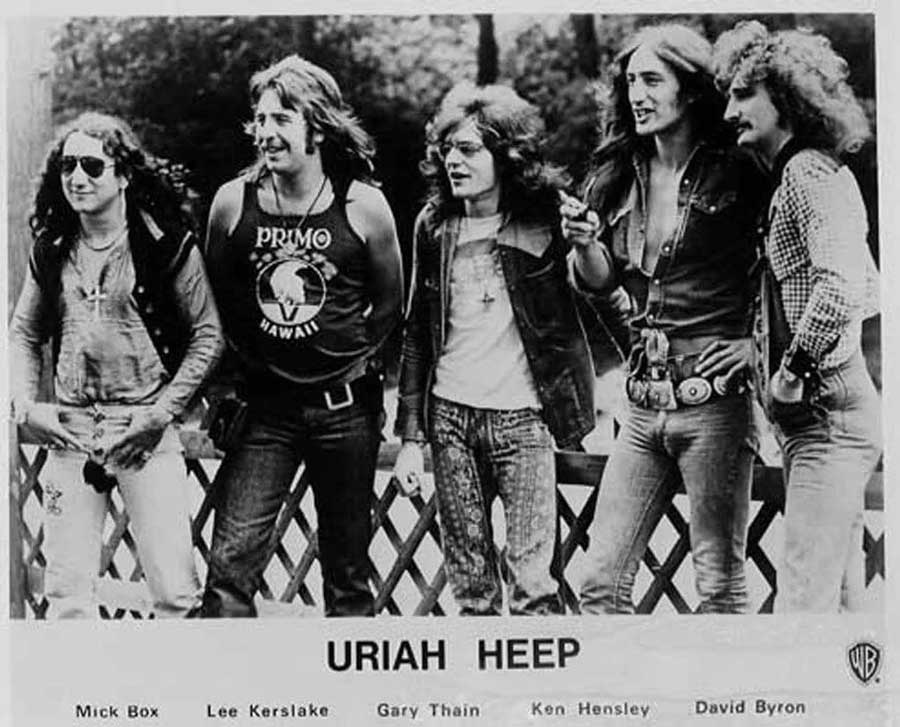
Rockpages.gr: There are some 70s and 80s band that claim that they shouldn’t write new songs and make new albums, since they are never going to match the classics and when they play the new stuff live the fans are going to be disappointed because the new songs will take the spot of some older songs they really wanted to listen to. What do you think of that?
Mick Box: That’s a very defeatist attitude, isn’t it? We would never think like that. We always think that the next song is going to be the one. I mean, to be fair, the new songs that come into our set into our life and on the albums, are the soon to be classics; that’s the way we view it. And we’re lucky enough to have had a lot of good songs that have stood the test of time, that people still like to hear them in the live arena and in their homes.
And then we give them new stuff that hopefully they will feel the same about in later life, you know? Classics? Unfortunately, require time to become classics. And, you know? that’s just life. But, we’d never be that defeatist.
Rockpages.gr: Playing guitar and writing material all those years, would you say that you are influenced by any contemporary, or even younger guitarists than yourself, or would you say that your influences are still the same since you first started playing?
Mick Box: Absolutely not with anything new. No. You know, I like to play guitar with feel, not like a typewriter. It doesn’t touch me. Listen to a guitarist like Jeff Beck, he says with one note what somebody says with a thousand notes, and that’s where I am.
That’s the club I’ve been, the one-note-club. Because, I think music should be felt, it shouldn’t just be a blur of notes… And solos should be worked out to enhance the song and not take you in another direction from the song and come back. It just doesn’t work for me. So, my influences are probably still the same way back, when I was very much into jazz and things like that
I’d rather listen to a guitar is like, say Paul Kossoff from Free, than I would to any of the shredders of today.
Rockpages.gr: So, how was it back then, when you were first starting, in a world without smart phones, smart watches, social media, computers, even… robot vacuum cleaners?
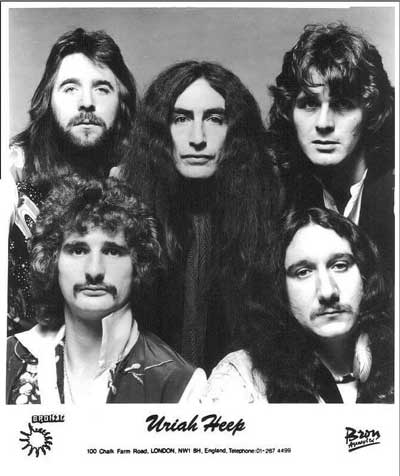
Mick Box: It was a very creative time, especially in the music business, because coming out of the ‘60s where it was all smart suits, smart haircuts or doing little dance routines, sweet songs, lovely melodies and we kind of came along and shook the whole thing up with Led Zeppelin, Deep Purple and Black Sabbath in England, of course. We had the long hair, it was a rebellious time. It was a lot different. Everything was tactile. You could pick up an album, read it, put it on, you actually put the needle on. There was all that touch stuff and the romanticism of waiting for an album and going to the record stores and flipping through and fully went out and yet the excitement of hearing it… All that’s gone. Now we listen to it differently, we buy it differently, we look at it differently, and it’s all on a keyboard with one finger. So, it’s certainly a lot different to what it was back then. And I think back then it was a very, very creative time because when you start with the record label you signed for six or seven albums and you agree with the label and the label agree with you, there was none of you’ve got to sound like this, look like this, play like this, be like this. We never had that. We were just allowed to develop our music. I think that’s why all that great music came out of that time that people are still hearing.
Rockpages.gr: You belong to the first generations of rock stars, who were the first to write the rulebook from scratch, in a world full of excesses, booze, drugs, women, money etc.
Mick Box: Weel, what’s wrong with that? HAHAHAHA!!!
Rockpages.gr: I didn’t say there was nothing wrong, but certainly some bands, and artists couldn’t cope with all that…
Mick Box: Well, we’ve got it down to drugs at the moment, and that’s junior aspirin… for headache! Hahaha! Yes, it was a crazy time. Yeah, of course. The whole business went into excess in every regard. Even when you were making an album deal, like I said, you were signing for six or seven albums! Everything was bigger and larger and better and everyone went crazy. And then it comes a time when you start losing people like, Jim Morrison and Janis Joplin and Jimi Hendrix and you say “hang on, this stuff we’re doing isn’t quite as much fun”. Some of us, like myself, could come back from the brink. Because, I’m quite grounded in my approach to life and everything else. For others, it was a difficult thing for them to work. They couldn’t stop. And they ended up, you know, not being here. So, yeah, it’s all they would dictate to all of those things you just mentioned. I was able to have an ego to get on stage and play. But, when I came off, it was it was just me again. Other people didn’t do that. They lived it 24/7 and you can’t be like that. You just been given a talent that you used to enjoy with people, and that should be it, but it isn’t to a lot of people, they believe everything. And that’s an unhealthy way of looking at it.
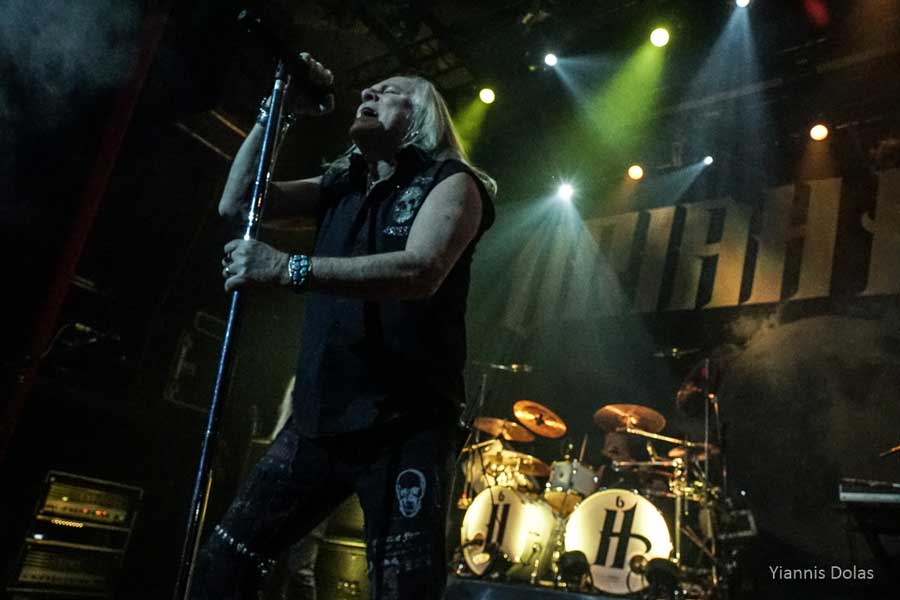
Rockpages.gr: How crucial was the “Abominog” album for Uriah Heep, when you were left alone trying to re-assemble the band? Did you think that it was all over?
Mick Box: Oh, no, no. I never really thought that at all. No, I think there’s one crucial point just before “Abominog”, when we ended the “Conquest” album and that line up and there was a moment of doubt. But, you know, it was just one weekend. And then I phoned up Lee Kerslake, who was in Ozzy Osborne’s band, and I phoned him to wish him good luck. And I said to him, “look, good luck for America and everything” and he said, “I’m not going. Sharon wants an all-American band”. So, I said, “oh, that’s handy”! I’ve got a touring and recording contract, would you fancy, coming along”? And he said, yes, as long as the previous manager wasn’t involved. So, then I asked my old pal Bob Daisley, who was the bass player. And he said: “oh, Yeah, I’d love to come along”.
So, I got the band together very, very quickly. Remember the Heavy Metal Kids had a great keyboard player, Jon Sinclair, and we toured with them extensively. So I knew he was capable of a fit in that role. And then we’d already auditioned Pete Goaldby, the vocalist, before we took out John Sloman. I remember him having a great voice. He just didn’t show everything he had within that edge, if you like. But I knew there was more to him than that. I phoned him up, he came in, and then we went to the rehearsal studios for about two weeks and to try out what Bob and I had written and it was like, “wow, we got something! Let’s take it further”. And we did. We went top 40 in America and went over there in America and toured with Def Leppard, who were just huge at the time because they had a song called “Pour Some Sugar On Me”, I think it was (Ed, he means “Photograph”) that just hit on MTV big time. So yeah, it was a very exciting time.
Rockpages.gr: Is there an album that you thought that is underrated, or got really bad reviews back in the day and time did justice?
Mick Box: Well, we never really got any bad, bad reviews. I think when we first came out there was a lot of controversy about us because in all honesty, in London Zeppelin were already established, Purple were established, Sabbath were established and then we came along in a blaze of publicity. And I think the press were going, “oh, not another one!”, And then, it was the musical template changing very much. Dylan in London and folk rock… So, us, the last heavy ones we got a lot of bad press publicity, but to me that wasn’t a problem. It was not a problem at all because it kind of gave us an underground basis, if you like; no matter what the press wrote, we were still filling out all the venues. We were still doing three or four encores every night. We still… Bucket loads of albums were being sold. So it was all good, you know, except for that little hiccup there. And we outgrew that. And of course, you know, 50 years on, we’re showing them that we were right and they were wrong.
You are always going to get criticized, but that’s fine. It’s always the people that count… the fans. Because, they say in their numbers in buying things, buying your product, your t-shirts, your concert tickets… So, they’re really the only ones that we actually listen to.
Rockpages.gr: How about your relationship with Ken Hensley, would you say that it was competitive, like say John Lennon and Paul McCartney?
Mick Box: Very much so. Ken was a very talented musician, writer, I could never deny that he was wonderful. But, I think he said in his own words, he said “it was a business relationship, not a friendship”. And that’s the way he saw it, not the way we wanted it. It was the way he saw it and which was okay. But, it just made it difficult at times, you know? He created a whole world around us. For instance, out on the road, he created a whole world around himself. Whereas we had everything we wanted, to manage it. Everybody had his own two managers and this and that, you know. He made that separation himself, which was a shame, really, because, it could have been a lot healthier had he not done that. But who knows? You don’t know. We’d still be friends. But, you know, it was never a friendship.
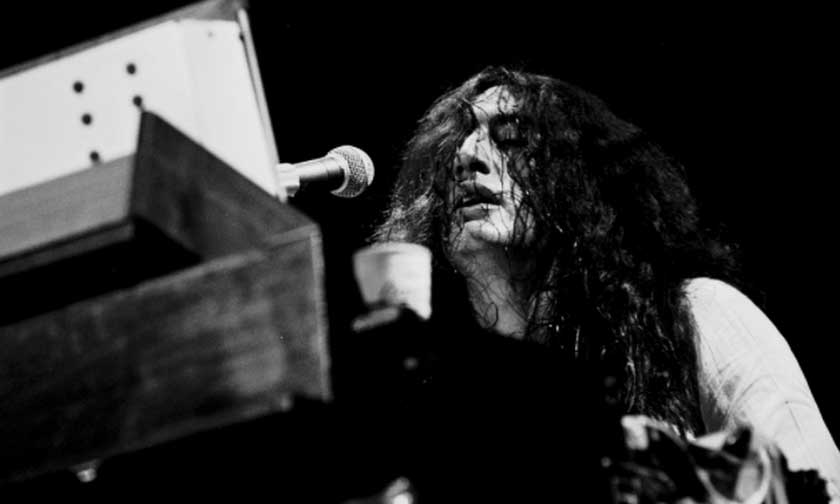
Rockpages.gr: I always wanted to ask you about John Wetton, who became a member of Uriah Heep for a brief period. How come you didn’t work with him more?
Mick Box: Yeah, John was a talented guy of course. We were looking for a bass player and we were actually out in Florida sitting around at a swimming pool and King Crimson were touring out there as well. We knew at the time we were going to have to get a bass player. And so we asked John. John said, “I’ve had enough with Crimson. I’ll go back to England, this would be it”. So, we thought, “oh, perfect timing”. Plus there was a friendship between Lee Kerslake and John because they both came from the same town, in the same country, Bournemouth in the South of England on the coast.
And so when the opportunity came, we just phoned him up knowing he was available and asked him if he wanted to have a go. And he said “yeah, I’d love to”. And he came up and fit it in straight away, because he all had the chops and he could handle it all very well. So it was another rebirth of the band, if you like, with John involved. But, I think when David was fired, John felt that it was time for him to move on. So, he went at the same time… Basically, John kind of had an agenda, if I can put it this way, he had a diary with… Pop band, rock band, progressive rock band, metal band, whatever it was, you know… And he was just ticking them off… He’d done the prog band… Yeah. And the pop band, Roxy Music. Yeah, Uriah Heep rock band… Yeah, I’ve had that. And then I’m going to go have another progressive rock band with Asia, but with a bit of a pop side… Yeah! It was kind of like that sort of agenda and to his credit everything he touched he made it very successful… Marvelous!
Rockpages.gr: What’s the secret of your longevity, which is more than 50 years, right?
Mick Box: It’s 52 now, heading to 53. Well, you know, I don’t think there’s any secret. I think the most obvious is that it’s all about the music. People come to hear the music and see it played live. And we’re lucky enough to have a lot of good songs that stood the test of time that people still like hearing and we also have the forward thinking that we have new songs as well. So it kind of make everything vibrant. We’ve got a lot of fans that have just been with us for years, but we’ve also got a lot of fans that just found out about us, you know, so it’s, you know, age group probably from 7 to 70! Hahaha!
